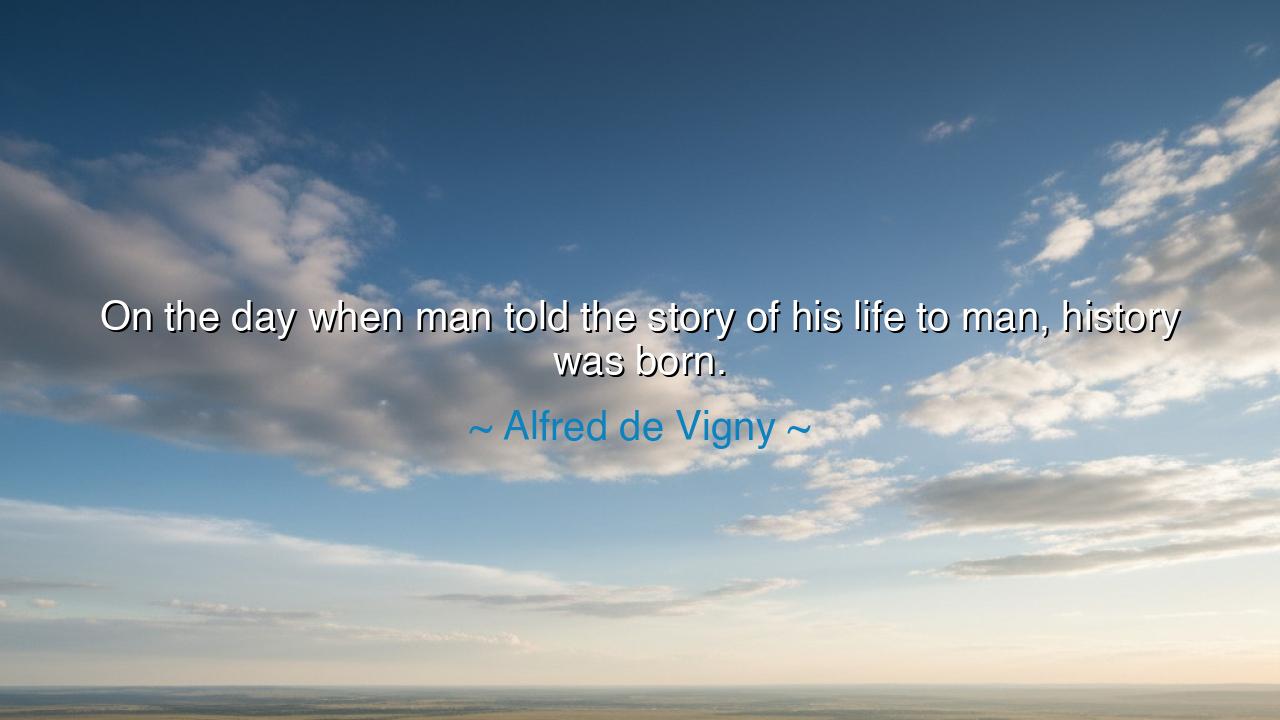
On the day when man told the story of his life to man, history






“On the day when man told the story of his life to man, history was born.” So wrote Alfred de Vigny, the poet and philosopher of Romantic France — a man who peered not merely into the events of the world, but into the soul of time itself. In his words we find the dawn of something sacred: the moment when humanity first looked upon itself and spoke. Before this moment, men lived, fought, loved, and perished in silence; the wind bore their deeds away. But when one man turned to another and said, “This is who we are; this is what we have done,” then began the unbroken chain of memory that we call history.
In these few words, de Vigny reveals that history is not born of action, but of remembrance. A thousand great deeds may vanish if no voice recalls them; a single whisper of truth can outlive empires. For it is not the doing that endures, but the telling. The first hunter who spoke by the fire, recounting how he faced the beast and survived, became the first historian. His story gave courage to others, taught wisdom, preserved the flame of experience. Thus, from storytelling sprang civilization itself — for through shared memory, mankind discovered identity, purpose, and destiny.
This idea, so poetic and profound, reaches deep into the marrow of human origin. Long before parchment or ink, long before kings and chronicles, men carved symbols upon cave walls — marks of remembrance. The painted hunts of Lascaux, the etchings of spears and beasts, were not idle art but the first acts of defiance against forgetfulness. They declared, “We were here.” And when those marks were joined by speech, when fathers told their sons of their battles and wanderings, history began to breathe. It was the birth of self-awareness, the moment when man understood that his life could echo beyond his days.
Consider, for instance, the tale of Herodotus, whom the ancients called the Father of History. He wandered through lands and cities, gathering stories of kings and warriors, weaving them into a tapestry of human struggle. Yet what made his work eternal was not the glory of the battles he described, but the wisdom he preserved: that empires rise and fall, yet human nature endures. Through him, the deeds of forgotten peoples were given voice; their triumphs and follies became lessons for the generations that followed. In Herodotus, de Vigny’s insight found its living form — for he did not merely record events, he made them live again through the sacred act of telling.
But de Vigny’s quote bears a deeper meaning still: it is not only nations that have histories, but souls. The day a man tells his own story — truthfully, without pride or shame — that day his personal history is born. For to speak one’s story is to order chaos, to give shape to experience. Silence imprisons memory; storytelling redeems it. Every person, then, becomes a historian of their own heart. And if they are honest in their telling, they too preserve the truth of mankind. For within the smallest life lies the echo of the whole human journey — fear and faith, loss and hope, the eternal longing to be remembered.
Thus, my children, the poet’s wisdom is this: to tell is to create, to remember is to endure. History is not merely the record of kings, but the song of all who dared to live and to speak. The tyrant who burns the scrolls may destroy the page, but not the word, for once spoken, truth becomes a seed in the soil of memory. Each generation inherits this sacred duty — to listen and to tell, to keep alive the stories that make us human.
Let this then be your charge: do not live in silence. Tell your story. Tell it to your children, your friends, your world. Speak of your struggles and your victories, your doubts and your dreams. For in the telling, you become part of the eternal chain — the great chorus of humankind that stretches from the first firelight to the stars. The man who tells his story gives meaning to his life, and the listener who remembers it gives him immortality.
So remember de Vigny’s words: history is born not in the doing, but in the telling. Live greatly, yes — but speak truly. Let your story join the great river of human memory, so that when future generations listen for the voice of their ancestors, they may hear your echo among them, whispering across time: “I was here — and this was my life.”






AAdministratorAdministrator
Welcome, honored guests. Please leave a comment, we will respond soon